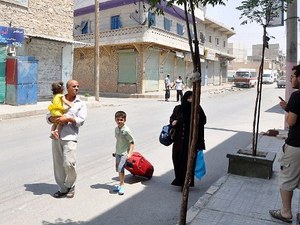Scared Aleppo Residents Flee the Onslaught

Panic-stricken civilians crammed inside minivans, on the back of pick-up trucks and inside cars fled on Saturday from strife-torn Syria's second city Aleppo, the word "shelling" on everyone's lips.
Crowds of tired men, scared women and children have been arriving at Atareb, about 30 kilometers west of Aleppo, Syria's commercial hub that is now a key battleground, with regime forces launching an assault on the city.
Troops backed by tanks and helicopter gunships moved on southwestern districts of Aleppo early on Saturday, where rebels concentrated their forces when they seized much of the northern city on July 20.
"More than 3,000 refugees left yesterday (Friday)," says one rebel checking the identities of refugees as he kept an eye out for policemen, soldiers or pro-regime "shabiha" militiamen.
"But since this morning it hasn't stopped, and more than a thousand civilians have fled by road."
The intensity of the bombardment in Aleppo has triggered a massive exodus of residents to villages controlled by rebels or across the border into Turkey.
Refugees on board a bus stopped by rebels remain silent in the scorching heat, shocked by their sudden departure.
They refuse to give their names but are willing to say a few words without incriminating either regime forces or the rebels.
"It's been four days that there is no water or electricity in the (southern) Sukari district," says one man next to a veiled woman with a baby in her arms.
"This morning shells fell every two or three minutes, on our homes, our buildings," he says, adding that finally the family took a bus and fled the city under fire.
"I saw planes opening fire and artillery shells falling," says an angry man, describing the loud noise of the bombardment and children crying.
In another vehicle a 60-year-old man in thick spectacles curses what he called the "indiscriminate bombing."
"The bombs were falling all over the neighborhood of Fardoss. Buildings collapsed. There are dead and injured under the rubble," he says, gesturing helplessly with his hands.
"What can we do but flee?"
Most refugees say it was the same in other Aleppo districts of Salaheddin, Mashhad and Sukari. Many left when the first bombs fell at dawn.
"We waited until 6 am and then fled. Look at my children," says a man in the back of a pick-up truck loaded with a dozen youngsters.
"I'm not sure we will return," he adds.
Rebels in Atareb check every vehicle and the papers of every man of fighting age.
"We are hunting for shabiha," says a rebel, adding that his command has lists of the militiamen who live in various Aleppo neighborhoods.
"We look at what neighborhood a refugee lives in and we check that with the command."
They arrest one policeman on Saturday, and a member of the rebel Free Syrian Army arrives to check on the detainee, saying he is his cousin.
He says his cousin is "crazy" and should be released, but he still leaves empty-handed.
The rebels in the town are nervous. Atareb, the scene of fierce fighting several weeks ago, is facing an influx of a kind it is ill-equipped to handle.
Food is becoming scarce.
Hundreds of refugees from Aleppo, residents of Atareb and surrounding villages have been waiting for hours outside the gates of a factory that supplies slabs of bread. Each bag of eight slabs costs the equivalent of 25 cents.
But now the factory is operating at half capacity.
"Workers are not reporting to work as they are afraid of the bombing," says one employee, pointing to holes from shells in the ceiling and walls.
"We went from 35,000 to 10,000 bags today," says an official.
"We were forced to ration bread to three bags because people are panicking and want to take ten."
Workers and residents are all edgy, with some trying to scale the gate or walls, while others drum on the iron door.
When the gate finally opens, dozens of people rush inside. The only way a guard can restore calm is to fire a volley of shots into the air.
